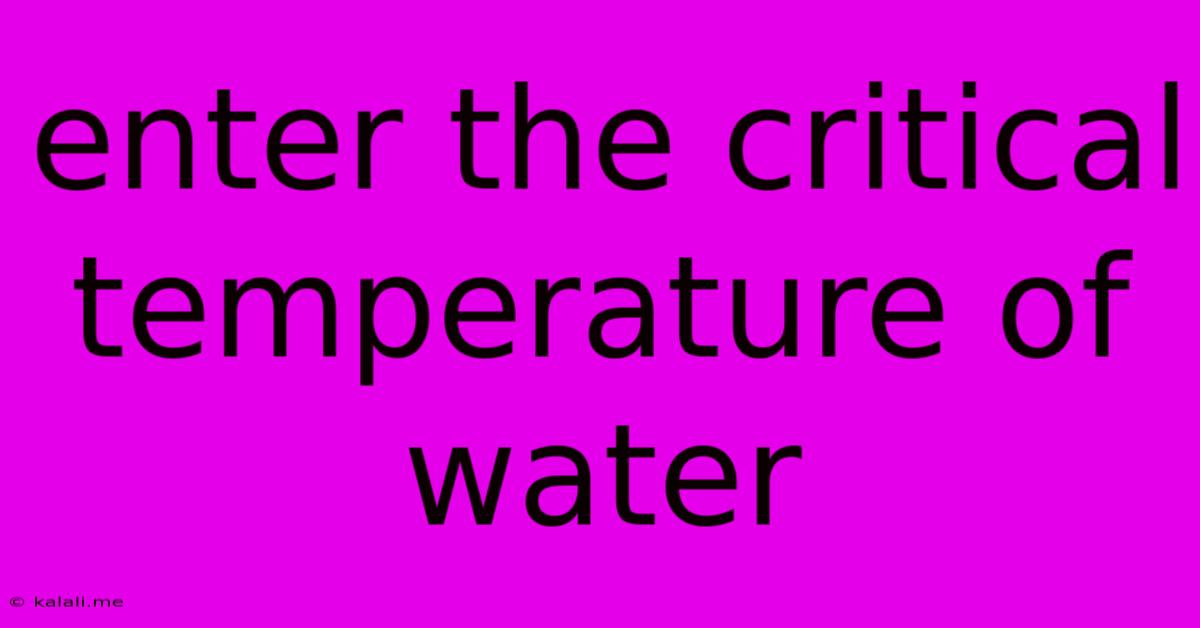Enter The Critical Temperature Of Water
Kalali
Jun 15, 2025 · 3 min read

Table of Contents
Enter the Critical Temperature of Water: Understanding a Unique State of Matter
Water, a seemingly simple substance, exhibits remarkably complex behavior. One fascinating aspect lies in understanding its critical point, specifically its critical temperature. This article will explore what the critical temperature of water is, its implications, and its significance in various scientific fields.
What is the Critical Temperature of Water?
The critical temperature of water is the temperature above which water cannot exist as a liquid, no matter how high the pressure. This temperature is approximately 374°C (705°F). At this point, the distinction between liquid and gaseous phases disappears. Beyond this critical temperature, water exists as a supercritical fluid.
Understanding Supercritical Water
Supercritical water possesses unique properties that differ from both liquid water and steam. It has a density intermediate between liquid and gas, and its solvent properties are dramatically altered. These characteristics make it valuable in various applications.
- Increased Solvent Power: Supercritical water acts as a powerful solvent, capable of dissolving many organic compounds that are insoluble in regular water. This is due to the decreased polarity at temperatures above the critical temperature.
- Reduced Surface Tension: The surface tension of supercritical water is significantly lower than that of liquid water. This characteristic makes it ideal for certain chemical processes that require enhanced mixing and interaction.
- Tunable Properties: By adjusting the temperature and pressure around the critical point, the properties of supercritical water can be precisely tuned to suit specific applications. This controllability is a significant advantage.
Applications of Supercritical Water
The unique properties of supercritical water have opened up numerous applications in various fields:
- Wastewater Treatment: Supercritical water oxidation (SCWO) is used to effectively treat hazardous waste, including organic pollutants and industrial byproducts, by oxidizing them at high temperatures and pressures.
- Chemical Reactions: Its enhanced solvent capabilities make it useful as a reaction medium in various chemical processes, including organic synthesis and catalysis.
- Food Processing: Supercritical water extraction is employed to extract valuable compounds from food materials without using harsh chemicals, leading to cleaner and more efficient processing.
- Energy Production: Research is ongoing into the potential of supercritical water reactors for efficient power generation.
The Importance of Pressure
While the critical temperature is crucial, it's important to note that pressure plays a vital role in reaching the supercritical state. Even at temperatures above 374°C, water will remain a liquid if the pressure is sufficiently high. Only when both temperature and pressure surpass specific critical values does the supercritical fluid state emerge. The critical pressure for water is approximately 22.1 MPa.
Conclusion
The critical temperature of water, 374°C, marks a transition point where water transcends its familiar liquid and gaseous states, entering a unique supercritical phase with remarkable properties. Understanding this critical point is fundamental to utilizing supercritical water's potential across numerous applications, ranging from environmental remediation to advanced chemical processes and energy production. Future research promises further exploration of this fascinating state of matter and its potential to revolutionize various industries.
Latest Posts
Latest Posts
-
What Is The Lcm Of 12 And 14
Jun 15, 2025
-
One Organism Benefits And The Other Is Unaffected
Jun 15, 2025
-
Which Is Not An Application Of Ohms Law
Jun 15, 2025
-
What Is The Starting Material In The Following Reaction
Jun 15, 2025
-
What Is The Hybridization Of H2o
Jun 15, 2025
Related Post
Thank you for visiting our website which covers about Enter The Critical Temperature Of Water . We hope the information provided has been useful to you. Feel free to contact us if you have any questions or need further assistance. See you next time and don't miss to bookmark.